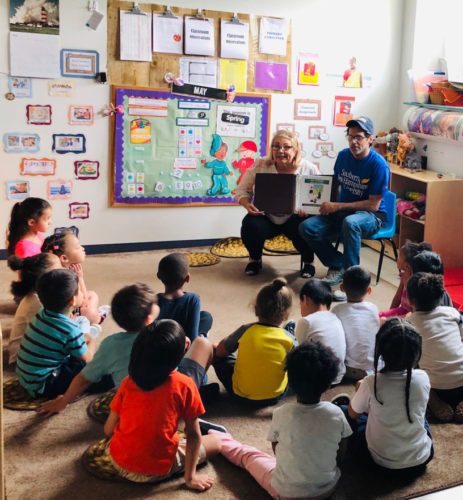Migrant Farmworker Children Struggle to Hold On
By Vashti Kelly, Health and Safety Program Manager, Association of Farmworker Opportunity Programs

Photo courtesy of AFOP.
Children from Latino migrant farmworker families are some of the most educationally marginalized students in the United States. They experience significant stressors and risks directly related to the circumstances surrounding the migrant farmworker lifestyle, which are linked to maladjustment as well as lower academic engagement and success.
Migration alters the composition of the family dynamic in many different ways. In each scenario, however, the children are negatively impacted by it- when they are left behind by parents; brought along by parents; or when they migrate alone, without parents or guardianship. Additional stressors include social exclusion, which is defined by Duffy as the “inability to participate in economic, social, and cultural life, and in some characteristics, alienation and distance from mainstream society.”[1] For migrant farmworker children, social exclusion often manifests itself as prejudice and discrimination in the academic setting.
As a former teacher in a predominantly agricultural community, I can attest to the lack of assimilation among Latino farmworker children. Being children, they are not always equipped with the tools to deal with their feelings, and so they manifest as disruptive behavior or failing grades. Although we as adults tend to compartmentalize our lives, it’s not so simple for children, in particular farmworker children, who are shouldering additional burdens. It is difficult to remain motivated and optimistic about your future when your constant is the impermanence of migrant life, leaving anxiety and stress as the constant reality. All of this takes a toll on a child’s ability to focus on their schoolwork.
The constant mobility and language barriers hinder the educational achievements of farmworker children, not to mention their parents’ lack of language proficiency, low education and income, and unfamiliarity with the educational system. These factors and the immediacy of poverty and lack of basic needs ultimately breed disadvantage in life, since education is often disregarded for the opportunity to work, and then the resulting lack of educational achievement leads to low skilled, low-paying employment as an adult.
And, for the farmworker children who manage to overcome all of these barriers and persevere, there is still the barrier of how the school system is set up, since no two school districts are the same. So, despite completing work assignments and seeking out additional help or even managing to attend summer school while balancing work, credits don’t always transfer, and many children are left with no other recourse but to repeat classes or even grades which goes a long way in explaining the high dropout rates among farmworker children.
The key is to change the mentality around agriculture in the US. Laws need to be amended to match those of all other industries making it illegal for children under the age of 16 to work in fields of industrialized agriculture. However, that means that additional funding for parental resources need to be increased so that parents have safe alternatives to taking their children into the fields. There needs to be more funding to allow Migrant and Seasonal Head Start and Migrant Education Programs to hire additional staff and provide the necessary services to migrant and seasonal farmworker children. And, ultimately, paying farmworkers a living wage and overtime pay is the way to go.
With more than a decade under my belt on farmworker issues, the two things that you always hear are:
- Wow, I can’t believe this is happening in the US.
- What can I do?
The answer is to acknowledge the issue, not with a simple pass of interest but rather examine the problem. We cannot continue to turn a blind eye; when it gets uncomfortable, that’s when we need to dig in a stay focused on the issue at hand. Discomfort leads to action and action leads to change and change is what is needed.
Every year AFOP’s Health & Safety Programs’ CIFC holds its Migrant & Seasonal Farmworker Children art & essay contests, providing a platform for farmworker children to share their personal stories. [Editor’s note: the results of our 2019 contest have been posted on CIFC social media today!]
These are our children and America’s future; we need to invest in them for a brighter tomorrow.
For more info about AFOP and the Children in the Fields Campaign, please visit www.afop.org.

